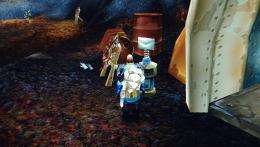Stanford mathematician: In reality, simulation is key to math education

(PhysOrg.com) -- Role-playing games such as "World of Warcraft" could reverse the declining math proficiency of middle school students, Keith Devlin told an audience at the AAAS annual meeting in San Diego.
A massively multiplayer online game requiring players to employ mathematical concepts could revolutionize the teaching of mathematics at the middle school level, according to Stanford mathematician Keith Devlin. That's the age when math and science proficiency plummets among U.S. students. Devlin says the game project would be so complex and expensive that the federal government would likely have to spearhead it. But, he said, a pilot project showed such a game would be doable.
"We are at a moment in history where mathematics education, at least at the middle school level, could change completely and dramatically," according to Keith Devlin, a Stanford mathematician with an interest in how the subject is taught.
For the past five years, Devlin has been part of a pioneering effort to create a massively multiplayer online game, something to rival "World of Warcraft," but tailored as a tool for mathematics education. "World of Warcraft" is a wildly successful role-playing game that currently has more than 15 million players.
Devlin thinks the role-playing approach has tremendous potential, but based on his experience, he said, it may take a national initiative to make it happen. He will be explaining his views, and exhorting his peers to work to promote such a project, on Friday, Feb. 19, at the American Association for the Advancement of Science annual meeting in San Diego.
Devlin collaborated with a group from private industry to develop a prototype of such a video game to help teach middle school students math by fully immersing them in a simulated three-dimensional environment.
Rather than having players kill other characters, as many role-playing games require, Devlin would have them employ mathematical principles to build various devices and overcome hurdles as they negotiate their way through the imaginary world. But there would be no overt mathematical symbols. No equations, no pencil and paper, no solving for "X" and above all, no textbook.
Only after playing the game and getting experience in using mathematical principles to get ahead would the kids get exposed to equations and mathematical symbols - and be motivated to open their textbooks.
Learning by doing
The philosophy guiding the game's design could be summed up in one simple tenet: The best way to learn how to do something is to do it.
"If you're going to learn to play tennis, you don't read a book about tennis, you play tennis," Devlin said. "The textbook is perhaps the worst possible medium for teaching mathematics, but it was the only one we had for 2,000 years."
The game project was prompted in part by a desire to reverse the well documented - and worsening - decline in math and science proficiency among middle school students in the United States, Devlin said.
"The dropoff is so huge that by the time they get to high school, it is too late," he said. "But middle school is the age where the kind of environment I am talking about really would work. It is perfect for that." The apparent ease with which many middle school kids get hooked on video games would seem to support Devlin's contention.
But Devlin said there was a sticking point in developing such a game.
"It turns out to be unbelievably difficult to do it," he said. "It is doable. But it is horrendously time consuming and it is expensive."
Devlin was collaborating with a well-known commercial video game design company, the name of which he can't reveal. "They used to be the bad boys of the video game world, because they were all these guys with rings through their noses," Devlin said. "Now they are in their forties, parents with kids of their own going through the school system. They are interested in education and they have a lot of expertise."
Devlin said the biggest hurdle in designing the game is the need to have the game change in response to each action by a player.
Costly investment
Devlin estimated the cost of fully developing such a game at $100 million to $200 million. He said that is far too much for a video game company to invest in an educational product that will offer relatively limited returns compared to a commercial game.
Devlin said that the federal government should get involved because of the potential strategic benefits. Students in countries that are U.S. economic competitors, such as India, China, Singapore and Japan, outperform American students in mathematics "big time," he said.
"I'm not one of these people that think it is all doom and gloom," he said. "It is still the case that the U.S. produces the most innovative people.
"But then when you need to hire 200 engineers, where do you find them? Well, we know where you find them - you find them in India, Russia, Singapore and China," he said.
Teaching math in a virtual world "is the next shift after the printing press," Devlin said. "It is that big in mathematics education. Not advanced mathematics; you couldn't teach calculus, I don't think, in a video game. But middle school mathematics you sure can. And it would change a lot of the educational landscape."
Devlin is a co-founder and the executive director of the Human-Sciences and Technologies Advanced Research (H-STAR) Institute at Stanford. The institute is devoted to the study of how human beings interact with technology and how to enhance those interactions for maximum benefit to people. He also appears intermittently on National Public Radio as "The Math Guy," explaining mathematical aspects of current topics ranging from the geometry of parallel parking to the solution of Fermat's Last Theorem.
Provided by Stanford University
















